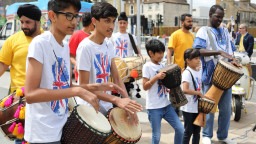Y2 Young people experience equality of engagement and no participant is discriminated against. Young people’s views are integral to the session and they are treated as musicians.

One question that sometimes arises when considering inclusion and equality is: do we need to be tolerant towards intolerance? The use of racist or discriminatory language on our projects is unacceptable, but if you write off and exclude people aged 12 or 13 for using this language then all you will achieve is to entrench these intolerant viewpoints. We need to assume that, with time, their views and their language choices can be changed at that age.
We work in a tolerant environment, so when a participant arrives who uses discriminatory language, they will instantly be shunned by the rest of the group. There may be young people in the group who face racism on a regular basis and who will, understandably, be very upset by these terms. However, we often find that the young people using this language do not see these words as racist. As practitioners, it is our responsibility to ensure that we foster a tolerant environment, in which everyone feels welcome and included.
When facing intolerance, the best thing to do is to stay calm and to address it in a non-confrontational manner. One of our ground rules in sessions is “No prejudice.” If we hear somebody break this rule, we try to use music as a means to address and overcome prejudiced perspectives. For example, if someone makes an Islamophobic comment, we will identify an artist that they like who is Muslim. This can then form the beginnings of a conversation in which we can challenge their intolerance.
Taken from DJ School UK.
Drake Music: We believe in the social model of disability in which people are disabled by society, not by their medical condition or impairment. Be aware of 'disabling barriers' to participation in music-making (for example buildings which are hard to access, instruments which are unsuitable, or warm-up exercises/other group activities that not everyone can join in with), and ensure music leaders have access to Disability Equality Training.
Example: A music hub organises an open access music session on a Saturday for both disabled and non-disabled young musicians. On offer is a range of both ‘music tech’ instruments (e.g. iPads and Skoog) as well as guitars, drums and keyboards. All young people are given the choice of which instrument they'd like to play with no assumptions made based on whether they face disabling barriers or not. The music leaders employ a range of approaches to try and ensure each musician can independently access the instrument of their choice.
